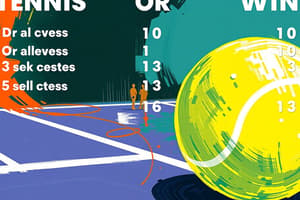Podcast
Questions and Answers
Why is anticipation particularly critical in serve return situations in tennis?
Why is anticipation particularly critical in serve return situations in tennis?
- Players have unlimited time to react to shots.
- The speed of serves can exceed 220 km/h. (correct)
- Players are required to serve the ball themselves.
- Players can only predict after the ball is hit.
What is the time frame within which tennis players must identify serves and react?
What is the time frame within which tennis players must identify serves and react?
- 200 milliseconds.
- 350 milliseconds.
- 500 milliseconds.
- 400 milliseconds. (correct)
Advanced players in tennis are able to predict serve reception performance at what level?
Advanced players in tennis are able to predict serve reception performance at what level?
- Better than chance. (correct)
- Exactly at chance.
- Worse than chance.
- Significantly worse than novices.
What contributes to a player's ability to anticipate effectively in tennis?
What contributes to a player's ability to anticipate effectively in tennis?
What is a significant risk players face when anticipating their opponent's intentions?
What is a significant risk players face when anticipating their opponent's intentions?
What was the primary aim of the study on information processing speed in tennis serve prediction?
What was the primary aim of the study on information processing speed in tennis serve prediction?
According to the study, how did advanced players perform when predicting serves at normal video speed compared to intermediate players?
According to the study, how did advanced players perform when predicting serves at normal video speed compared to intermediate players?
What was observed regarding serve prediction accuracy when the video was replayed at a much slower speed?
What was observed regarding serve prediction accuracy when the video was replayed at a much slower speed?
What hypothesis was made regarding the theoretical knowledge of advanced and intermediate players?
What hypothesis was made regarding the theoretical knowledge of advanced and intermediate players?
What might be a reason for the performance discrepancy between average and advanced players in predicting tennis serves?
What might be a reason for the performance discrepancy between average and advanced players in predicting tennis serves?
Flashcards are hidden until you start studying
Study Notes
Anticipation in Tennis
- Anticipation is crucial in open-skill sports like tennis, especially at advanced levels with fast-paced gameplay
- Players need to predict their opponents' actions quickly and accurately, particularly during serve reception
- Serving speeds can exceed 220km/h, giving players less than 400 milliseconds to identify the serve, plan a return, and react
- Predicting opponents' intentions can be risky, as incorrect guesses lead to negative consequences
Cue Recognition and Information Processing
- Anticipation in serve reception relies on identifying and analyzing advanced cues - hints that predict the serve type
- Research suggests advanced players are better at predicting serves than chance, proving the existence of predictive cues
- However, how advanced players differ from average players in using these cues is unclear
Information Processing Speed Study
- This study aimed to investigate how advanced and intermediate players utilize advanced cues to predict tennis serves
- The study hypothesized that both groups might possess equal theoretical knowledge but differ in their ability to detect cues under normal speeds
- The study predicted that advanced players would predict more serves accurately than intermediate players at normal speeds
Study Results
- Advanced players predicted the type of serve significantly more accurately than intermediate players when the prediction video was played at normal speed
- However, at slower replay speeds, there was no significant difference in prediction accuracy between the two groups
- This suggests that advanced players have a superior ability to process information quickly and efficiently, which enables them to make faster and more accurate decisions in real-time situations.
Studying That Suits You
Use AI to generate personalized quizzes and flashcards to suit your learning preferences.




